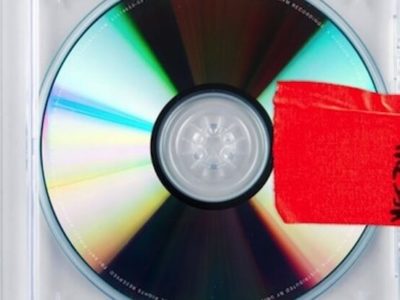On May 18, the new Kanye West track “New Slaves” was projected onto 66 different buildings around the world. Many curious fans videotaped and analyzed this track, hoping to get an idea of what West’s new album would be like. If “New Slaves” indicated anything for the then-upcoming sixth solo album, it was that Kanye’s tone has taken a turn for the aggressive; at times during the song he is borderline yelling (or actually yelling), rapping about unwritten codes of racism and consumerism (“you see it’s broke n***a racism/that’s that ‘don’t touch anything in the store’/and that rich n***a racism/that’s that ‘come in, please buy more…’”), his holier-than-thou state of existence (“Y’all n***as can’t f*** with me/y’all n***as can’t f*** with Ye”) and…just going plain nuts (“I’m ‘bout to wild the f*** out/I’m going Bobby Boucher.”).
A day later, he revealed another song to the public: “Black Skinhead,” equipped with Marilyn Manson-esque drums and hum hum-ing low synth. This track added to the speculation about West’s choice to use a brooding production style. Fans craved details, and, as more clues and hints about the record emerged, it became clear–both through the widely-read New York Times interview and a track simply titled “I Am a God”–that West’s already enormous ego was bigger than ever before.
When the album leaked days before its official release–one of the biggest online happenings of the year for the entertainment industry–those assumptions about darkness and engorged ego proved to be correct. We find Kanye West, one of the most prominent music figures of our generation, in his boldest, most arrogant, coldest-yet-hottest, and most graphic ever been in his illustrious career.
If we’re talking ego, we may as well start with the album title Yeezus (hopefully you can figure out how that word came to be) an, of course, the aforementioned song, “I Am a God”, in which he raps about his super-human status, a claim that could be considered blasphemous to many. The track features some of the most memorable lyrics of the album (“I just talked to Jesus/he said ‘what up, Yeezus?’”, “I know he the most high/but I am the close high”, etc.), paired with chill-inducing feral screams. It is very mind-altering, disturbing and hard to forget. Darkness may not be everyone’s cup of tea, but West captures it breathtakingly well.
The opening track, “On Sight,” also features memorable production. This is a stark contrast to “Dark Fantasy,” the opener on West’s previous album My Beautiful Dark Twisted Fantasy, which is layered with sounds and melodies rather delicately. “On Sight” starts out with aggressive synth noise (it’s much better characterized as noise than melody) that later finds its beat and loops continuously throughout the song. The noise perfectly matches West’s villainous voice and adds more to the rawness of the album. While other tracks on the album are bit more layered with different sounds, this song serves as an introduction to how West’s approach to music has changed from the maximalist yet refined production of My Beautiful Dark Twisted Fantasy to the beat-focused and assaulting tone of Yeezus. Plus, the mastering of the album is very, very loud–adding more to the abrasive tone that Kanye wanted.
Is Kanye’s approach new? Not really. Groups like Death Grips and Shabbazz Palaces have thrived on raw and combative hip-hop stylings for a long time. West also borrows a lot from the trending beat-oriented electronic and house music (made obvious by hiring Daft Punk to produce four of the ten tracks of the album). The difference is that, with the magnitude of fame and impact that West possesses, this record could be a game-changer for the hip-hop industry.
There are no dull moments on this album. It helps that this is the shortest album that West has recorded–40 minutes and only 10 tracks–but also the themes that he raps about are controversial and raucous enough to keep listeners’ attention throughout the LP. On the track “I’m In It”, West talks about sexual experience in such deep (no pun intended) and graphic detail that listening to it feels like reading a raunchy play-by-play. “Blood On The Leaves” narrates a story about impregnating a girl and having to face the responsibilities because she is too religious to get an abortion. A lot of the songs are shamelessly self-centered and they are not subtle–perhaps it’s the lack of subtlety that fixates me on this album. West’s lack of “giving a f***” is something to behold that also keeps our attention. Remember the South Park fish stick episode? If you listened to this album after watching the episode, both would resonate each other well in regards to Kanye’s personality.
At this point, no one is going to doubt Kanye’s confidence. In fact, it is so huge that he is forcibly changing hip-hop and has no doubt that he right. What’s more, he simply doesn’t care what anyone says. “I have this new strategy. It’s called no strategy…this whole process is about giving no f***s at all…I’ve got an idea on how to sell more music. It’s called make better music,” he raps. His confidence definitely oversteps into the realm of cockiness and it can come off to be very antagonizing and flawed. But maybe we are all intrigued by Kanye in the same way that we are by ego-maniacal villains from history books to Disney movies.
Photo from http://www.spin.com/sites/all/files/styles/style620_413/public/130531-kanye-west-yeezus.jpg



















